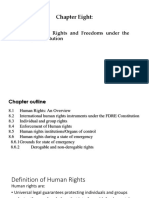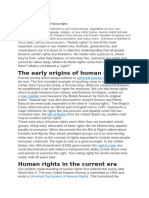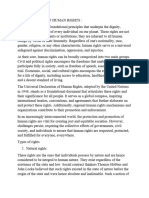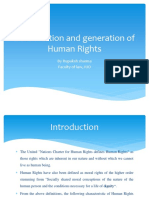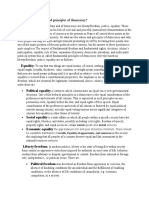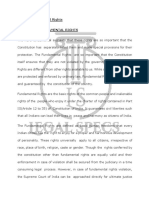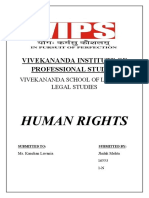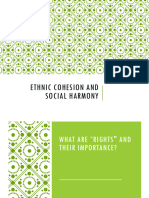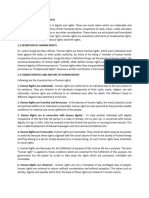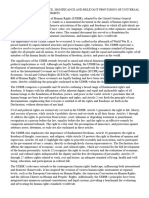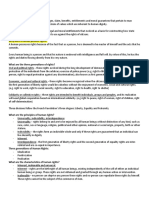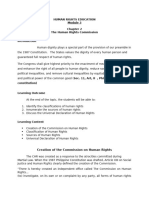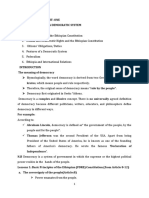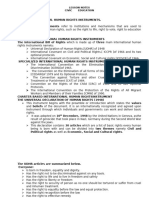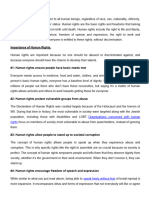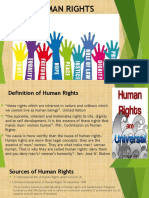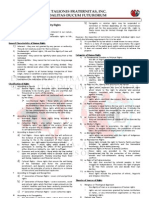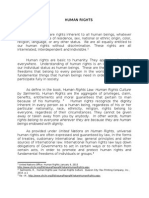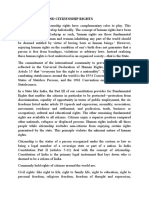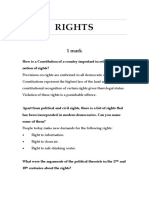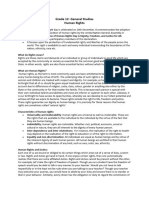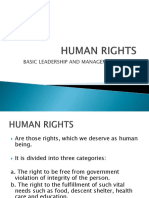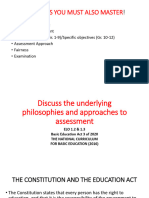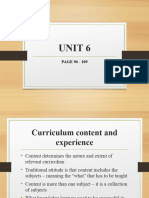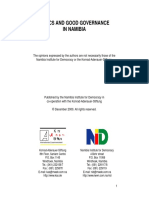0 ratings0% found this document useful (0 votes)
4 viewsELO 4.2 Human Rights and Fundametal Freedoms
ELO 4.2 Human Rights and Fundametal Freedoms
Uploaded by
kevinthefuture50The document provides an overview of the Namibian Constitution, including its historical context, key principles of human rights and fundamental freedoms, and classifications of different types of human rights. It also discusses the role of civil society in promoting human rights.
Copyright:
© All Rights Reserved
Available Formats
Download as PPTX, PDF, TXT or read online from Scribd
ELO 4.2 Human Rights and Fundametal Freedoms
ELO 4.2 Human Rights and Fundametal Freedoms
Uploaded by
kevinthefuture500 ratings0% found this document useful (0 votes)
4 views21 pagesThe document provides an overview of the Namibian Constitution, including its historical context, key principles of human rights and fundamental freedoms, and classifications of different types of human rights. It also discusses the role of civil society in promoting human rights.
Copyright
© © All Rights Reserved
Available Formats
PPTX, PDF, TXT or read online from Scribd
Share this document
Did you find this document useful?
Is this content inappropriate?
The document provides an overview of the Namibian Constitution, including its historical context, key principles of human rights and fundamental freedoms, and classifications of different types of human rights. It also discusses the role of civil society in promoting human rights.
Copyright:
© All Rights Reserved
Available Formats
Download as PPTX, PDF, TXT or read online from Scribd
Download as pptx, pdf, or txt
0 ratings0% found this document useful (0 votes)
4 views21 pagesELO 4.2 Human Rights and Fundametal Freedoms
ELO 4.2 Human Rights and Fundametal Freedoms
Uploaded by
kevinthefuture50The document provides an overview of the Namibian Constitution, including its historical context, key principles of human rights and fundamental freedoms, and classifications of different types of human rights. It also discusses the role of civil society in promoting human rights.
Copyright:
© All Rights Reserved
Available Formats
Download as PPTX, PDF, TXT or read online from Scribd
Download as pptx, pdf, or txt
You are on page 1of 21
The Namibian Constitution
Human rights and fundamental freedoms
Hifikepunye Pohamba Campus
2024
Historical summary
In November 1989-elections,. Namibians took
part in the election of a Constituent Assembly,
which had to draw up a constitution for an
independent Namibia.
A constitution is a written record of the
fundamental political principles according to
which a state is governed.
The constitution was to be based on the
constitutional principles drawn up in 1982 by the
five Western powers (the Western Contact Group)
in consultation with the parties to the peace
negotiations.
Summary…
Dr. Hage Geingob of SWAPO was elected
chairperson of the Constituent Assembly.
The constitution was adopted by a two thirds
majority of the Constituent Assembly in February
1990, as was the requirement.
9 February is known as Constitution day in
Namibia.
Two third majority
a political principle requiring that two thirds
rather than a simple majority of the members
of a politically organized group must concur
in order to exercise the power to make
decisions binding upon the whole group.
Two-Thirds Majority Vote means a vote
requiring twice as many eligible votes in favor
than opposed to pass.
The Namibian constitution
It came into force on the eve of Namibia’s
independence.( 20 March 1990).
A supreme law of the land, the ultimate source of
law in Namibia.
All other laws trace their legitimacy and source
from the constitution.
All laws in force before in depended shall remain in
force until repealed or amended by Act of
Parliament or until they are declared
unconstitutional by a competent court.( Article 140
(1)
Universal Declaration of Human rights(UDHR)
The Universal Declaration of Human Rights is a
resolution adopted unanimously in December 1948
by the General Assembly of the United Nations.
The objective of the 30-article declaration is to
promote and encourage respect for human rights and
fundamental freedoms
It contains rights which belong equally to every
person.
Namibian constitution ( ch.3 ) adheres to the UN
adoption- used UDHR as blueprint for drafting
Chapter 3.
The Namibian Constitution is based on the
understanding that human dignity and human
rights belong to all people – regardless of who they
are.
Human dignity, the quality of being worthy or
deserving respect, is an inherent quality, it does
not come from outside, e.g. through social status
or family connections.
It exists within each person as a natural and
inseparable part of being human. Humans are
born possessing human dignity.
Human rights
The Namibian constitution is a product of a
struggle for sovereignty and human rights.
It contains a Bill of Rights that outlines
fundamental human rights and freedoms.( A Bill of
Rights is a list of the mot important rights of citizens
of a country) .
Bill of rights are entrenched, i.e. they cannot be
modified by a country’s legislature.(Art.131)
Human rights and freedoms…
Human rights and freedoms contained in chapter 3
are entrenched and may not be repealed
( cancelled) or amended ( modified)
What are human rights /individual
rights? Art- 6-20
These are rights every individual is entitled to by
virtue of his membership of a society.
They are rights which all human beings have
equally , by virtue of being human, irrespective of
race, sex, age, social class, national origin, ethnic
or political affiliation, and regardless of economic
status, occupation, talent, religion or ideology
(Art.2)
They are claims(entitlements/privileges) which
individuals have- by virtue of being human- upon
society as represented by the government or other
institutions.
Human right is something that no one anywhere
may be deprived of.
Human rights...
They are inalienable( undeniable). They cannot be
transferred , forfeited or lost.
They are fundamental, i.e. They are important.
Life, dignity and other values depend on them.
They are indivisible, interdependent and inter-
related, i.e. they cannot be separated or divided,
and they depend on one another for full realization.
They are universal, i.e they apply equally the world
over
They are entitlements and we all have equal right
to them
Classification of human rights
Three traditional categories, i.e.
First Generation of rights/Blue rights ( civil and
political rights)
Second Generation of Rights/ Red rights( social
economic and cultural rights
Third Generation of Rights/Green
rights( environmental and developmental rights
First Generation of human rights
These are civil and political rights.
A class of rights that protect individuals' freedom
from infringement by governments, social
organizations, and private individuals.
They ensure one's ability to participate in the civil
and political life of the society and state without
discrimination or repression.
Examples: right to life, freedom of expression, of
religion, of political opinion, of conscience and
association, freedom from arbitrary arrest and
detention, right to privacy, property and equal
protection by the law.
the right to vote, the right to a fair trial, the
right to government services, the right to a
public education, and the right to use public
facilities.
natural justice (procedural fairness) in law, such
as the rights of the accused, including the right to
a fair trial; due process;(respect of all regal right
by state)
the right to seek redress( set unfair situation
right) or a legal remedy; and rights of
participation in civil society and politics such as
freedom of association or the right to assemble
Second Generation of Human rights
These are social, economic and cultural rights
the human right to work, the right to an adequate
standard of living, including food, clothing, and
housing, the right to physical and mental health,
the right to social security, the right to a healthy
environment, and the right to education
Cultural rights are human rights that aim at
assuring the enjoyment of culture and its
components
Third Generation of Human rights
These are environmental and developmental rights,
i.e. solidarity rights,
They are claimable by people as a group or community.
Environmental rights mean access to the unspoiled
natural resources that enable survival, including land,
shelter, food, water and air
Developmental rights: to participate in, contribute to,
and enjoy economic, social, cultural and political
development
Examples: right to a clean environment, right to peace,
fresh air, to leisure, right to equal opportunity and
development and other rights people enjoy as part of a
community.
Civil society and human rights
Civil society include organizations, association and
institutions that exist outside political parties and
or constituted by the state. Most of them operate
independently from government .
Civil society organizations( CSO), non-
governmental organizations(NGO’s) or non – profit
organizations( NPO’s)
Civil society play an active role in many spheres of
social and economic activities, thereby promoting
and enhancing human rights and democracy.
Perform variety of service and humanitarian
functions
Bring citizens concerns to government,
Encourage political participation through giving
information.
Focus on specific issues like human rights,
environment , development or health.
Fundamental freedoms- Art 21
These are liberties, autonomies contained in ch.3
and protected by law.( see Article 25(2)
List the fundamental freedoms as contained in
article 21.
The strength of real democracy depends on
fundamental rights and freedoms.
These rights and freedoms must be protected.
Government cannot interfere or change these
rights.
Namibia is a constitutional democracy- it functions
according to its written constitution
Limitations upon fundamental rights
and freedoms
Art 22. Makes clear the circumstances under
which the above freedoms can be limited by the
state, e.g. to prevent criminal activity and harm
others or to protect national interests.
Any laws placing limitations on fundamental rights
must specify the extent of such limitations and
must apply equally to everybody.
You might also like
- Human RightsDocument14 pagesHuman RightsFloramae ArcadioNo ratings yet
- HUMAN RIGHTS AND THEIR ENFORCEABILITY NotesDocument15 pagesHUMAN RIGHTS AND THEIR ENFORCEABILITY NotesOkema LennyNo ratings yet
- Chapter EightDocument26 pagesChapter EightPaul BielNo ratings yet
- Bill of RightsDocument3 pagesBill of RightsSam MNo ratings yet
- Chapter 1Document5 pagesChapter 1sohamkundooNo ratings yet
- I Am Sharing 'Generations of HR' With YouDocument4 pagesI Am Sharing 'Generations of HR' With Yousamiksha bajajNo ratings yet
- Classification and Generation of Human RightsDocument30 pagesClassification and Generation of Human RightsSubodh YadavNo ratings yet
- Commission On Human Rights of The Philippines (CHRP) and Human Rights Commission On Human Rights of The Philippines (CHRP) and Human RightsDocument35 pagesCommission On Human Rights of The Philippines (CHRP) and Human Rights Commission On Human Rights of The Philippines (CHRP) and Human RightsAriane ObraNo ratings yet
- Group 4Document50 pagesGroup 4krishamaedingding.202100410No ratings yet
- Human Rights Are IndivisibleDocument8 pagesHuman Rights Are IndivisibleJahirulNo ratings yet
- CJ04Document15 pagesCJ04Prince bhaiNo ratings yet
- Civic AssignmentDocument8 pagesCivic AssignmentMIKIYAS KEBEDENo ratings yet
- 4 Lectures On Human RightsDocument67 pages4 Lectures On Human RightsMarc Gar-ciaNo ratings yet
- Unit 1 Constitution BALLB II Sem PDFDocument91 pagesUnit 1 Constitution BALLB II Sem PDFMahimaNo ratings yet
- Human Rights-Research PaperDocument16 pagesHuman Rights-Research PaperJhalak MehtaNo ratings yet
- Democracy:, and Current Trends in U.S Foreign PolicyDocument10 pagesDemocracy:, and Current Trends in U.S Foreign PolicyresfreakNo ratings yet
- EC and SH 3Document27 pagesEC and SH 3RLC TunesNo ratings yet
- Classification of Human RightsDocument4 pagesClassification of Human RightsMoses B KargboNo ratings yet
- Human Rights NOTESDocument14 pagesHuman Rights NOTESJorg ィ ۦۦNo ratings yet
- human rightDocument7 pageshuman rightRoni SharmaNo ratings yet
- Human Rights Semester Part IIDocument49 pagesHuman Rights Semester Part IIrevodan666No ratings yet
- Lecture 1 Introduction To Human Rights Law 1Document43 pagesLecture 1 Introduction To Human Rights Law 1ChloeNo ratings yet
- KSLUENVLAWNotesDocument113 pagesKSLUENVLAWNotestrupti.raikar8No ratings yet
- Human Rights What Are Human Rights?Document6 pagesHuman Rights What Are Human Rights?Gelli TabiraraNo ratings yet
- Module-2.-Human-RightsDocument8 pagesModule-2.-Human-Rightsallauiganwinierose15No ratings yet
- Significance of Fundamental RightsDocument12 pagesSignificance of Fundamental RightsArun Kumar Panda.No ratings yet
- Human Rights NotesDocument76 pagesHuman Rights NotesnyathitolvishNo ratings yet
- Human Right PresentationDocument12 pagesHuman Right PresentationAastha ItaniNo ratings yet
- Human RightsDocument24 pagesHuman RightsBishop HoNo ratings yet
- Civics and Community Engagement Mids Last OneDocument21 pagesCivics and Community Engagement Mids Last One420ahmadraza420No ratings yet
- Democracy Human RightDocument20 pagesDemocracy Human Rightybetre515No ratings yet
- Unit 1Document9 pagesUnit 1Yishak AbrahamNo ratings yet
- Cvics For Grade 11th Unit 1 Short NoteDocument9 pagesCvics For Grade 11th Unit 1 Short NoteNatayNo ratings yet
- Human Rights 1Document10 pagesHuman Rights 1Shivam TiwariNo ratings yet
- International and Philippine Human Rights and FreedomsDocument58 pagesInternational and Philippine Human Rights and FreedomsArvhie SantosNo ratings yet
- Human RightsDocument21 pagesHuman Rightsrefai aliNo ratings yet
- Cve 12 Lesson PlansDocument56 pagesCve 12 Lesson Planswww.fenambakisye83No ratings yet
- Human RightsDocument8 pagesHuman Rightssunnyside36750No ratings yet
- Classification of Human Rights - MalawiDocument2 pagesClassification of Human Rights - MalawiRaimonah Gambao SambawaNo ratings yet
- Human RightsDocument15 pagesHuman RightsMichael Serate Cabardo100% (4)
- Human Rights by Irfan AliDocument5 pagesHuman Rights by Irfan AliShaista ParveenNo ratings yet
- GS ActivityDocument19 pagesGS ActivityS1L3NTKID GamingNo ratings yet
- Ilovepdfmerged 1714153659Document66 pagesIlovepdfmerged 1714153659Jwaljakhi SahooNo ratings yet
- Wa0023.Document4 pagesWa0023.samiulmirza083No ratings yet
- HCM NotesDocument2 pagesHCM NotesChristian Paul PinoteNo ratings yet
- Democratic InterventionsDocument5 pagesDemocratic InterventionsAnna Marie BuenaventuraNo ratings yet
- Introduction of Human RightsDocument4 pagesIntroduction of Human RightsSujan BaniyaNo ratings yet
- Assignment Human RightsDocument13 pagesAssignment Human RightsElaine Dianne Laig SamonteNo ratings yet
- Two Types of Democracy 1. Direct DemocracyDocument7 pagesTwo Types of Democracy 1. Direct DemocracyRukudzo Rukwata-NdoroNo ratings yet
- HUMAN RIGHTS Sanya KhanDocument9 pagesHUMAN RIGHTS Sanya Khanparthib100% (1)
- KSLUCLASSIFHMDocument114 pagesKSLUCLASSIFHMtrupti.raikar8No ratings yet
- Human RightsDocument33 pagesHuman RightsAmor F . Mallari Jr.No ratings yet
- Human Rights and Citizenship RightsDocument2 pagesHuman Rights and Citizenship Rights20C2438 Mohammed QaisNo ratings yet
- Class 11 Political Science - RightsDocument25 pagesClass 11 Political Science - RightsRamita Udayashankar100% (1)
- Human Rights NotesDocument61 pagesHuman Rights NotespgpcascommerceNo ratings yet
- Aming (Ma'am Ortiz)Document13 pagesAming (Ma'am Ortiz)Mlazaga, KristanielNo ratings yet
- Lesson 5 BookDocument11 pagesLesson 5 BookKhyla AmorNo ratings yet
- General Studies Grade 12 321708145 1727077902Document6 pagesGeneral Studies Grade 12 321708145 1727077902hithaishi272007No ratings yet
- Human RigthsDocument9 pagesHuman RigthsDexter MagbagoNo ratings yet
- ELO 1.2 1.3 Discuss The Underlying Philosophies and Approaches To AssessmentDocument19 pagesELO 1.2 1.3 Discuss The Underlying Philosophies and Approaches To Assessmentkevinthefuture50No ratings yet
- Study GuideDocument229 pagesStudy Guidekevinthefuture50No ratings yet
- Unit 4Document23 pagesUnit 4kevinthefuture50No ratings yet
- Evaluation of Instructional ElementsDocument16 pagesEvaluation of Instructional Elementskevinthefuture50No ratings yet
- Introduction and Psychoanalytic ApproachDocument79 pagesIntroduction and Psychoanalytic Approachkevinthefuture50No ratings yet
- Elo 1Document129 pagesElo 1kevinthefuture50No ratings yet
- CF81 06 Nor 2019Document14 pagesCF81 06 Nor 2019kevinthefuture50No ratings yet
- UNIT 6 P. 99 - 109 (1) Curriculum Notes (Education)Document24 pagesUNIT 6 P. 99 - 109 (1) Curriculum Notes (Education)kevinthefuture50No ratings yet
- Systemic ApproachDocument63 pagesSystemic Approachkevinthefuture50No ratings yet
- Guidelines For Teachers For Setting and Marking AssessmentsDocument38 pagesGuidelines For Teachers For Setting and Marking Assessmentskevinthefuture50No ratings yet
- ELO 4.1 Importance of A ConstitutionDocument17 pagesELO 4.1 Importance of A Constitutionkevinthefuture50No ratings yet
- Unit 7 Feedback and ReportingDocument20 pagesUnit 7 Feedback and Reportingkevinthefuture50No ratings yet
- Culture 23 April 2024Document18 pagesCulture 23 April 2024kevinthefuture50No ratings yet
- Elements of Culture HandoutDocument13 pagesElements of Culture Handoutkevinthefuture50No ratings yet
- ConceptsDocument1 pageConceptskevinthefuture50No ratings yet
- ELO 4 Structure of The Namibian GovernmentDocument12 pagesELO 4 Structure of The Namibian Governmentkevinthefuture50No ratings yet
- Gender Issues in Classroom Assessment LessonDocument24 pagesGender Issues in Classroom Assessment Lessonkevinthefuture50No ratings yet
- Invest Namibia Journal July 2020 Edition Issue 3Document56 pagesInvest Namibia Journal July 2020 Edition Issue 3Andy Shivute AndjeneNo ratings yet
- Ministry of Trade Annual Report 201213Document64 pagesMinistry of Trade Annual Report 201213Albert NicanorNo ratings yet
- Van Wyk, D. 1991 The Making of The Namibian Constitution JournalDocument11 pagesVan Wyk, D. 1991 The Making of The Namibian Constitution JournalThristi ThethirdNo ratings yet
- New Era NewspaperDocument2 pagesNew Era NewspaperSamNo ratings yet
- 2024 State of The Nation Address by His Excellency Dr. Nangolo Mbumba 14 March 2024Document20 pages2024 State of The Nation Address by His Excellency Dr. Nangolo Mbumba 14 March 2024HenryNo ratings yet
- Ethics and Good GovernanceDocument77 pagesEthics and Good GovernanceNOEL NCUBENo ratings yet
- Invest Namibia Journal (INJ) June 2019 EditionDocument60 pagesInvest Namibia Journal (INJ) June 2019 EditionAndy Shivute AndjeneNo ratings yet


